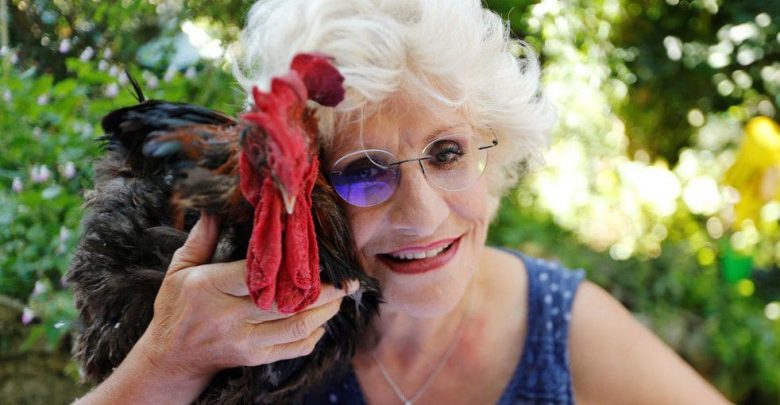
French judiciary ruled in favor of the rooster “Maurice”
القضاء الفرنسي يحكم لصالح الديك “موريس”
Maurice the rooster wasn’t looking for fame.
But then he got sued, and everything changed.
Before becoming a national symbol of the clash between countryside dwellers and city folks in France, Maurice lived a simple life in a chicken coop in Corinne Fesseau’s yard on the rural island of Oléron. Like all roosters, he greeted each morning with an exultant crow, like an alarm clock set to sunlight. And for a while, it was all fine — until a pair of vacationing retirees arrived next door.
They said Maurice was a nuisance. And when Fesseau couldn’t make him quiet, the neighbors turned to the courts in 2017, seeking Maurice’s removal from the neighborhood — and launching a bitter two-year legal saga.
It became far more than a noise complaint. Rural mayors were outraged, seeing the lawsuit as a threat to their way of life brought forth by intolerant urbanites who refused to adapt to the country soundscape. Tens of thousands of people came to Maurice’s defense, signing an online petition to “save our rooster.” They wore T-shirts that said, “Let me sing,” which could be found in local stores. Other roosters and their owners even attended Maurice’s court hearings, to show solidarity.
And on Thursday, Maurice found one last ally: the judge.
In a long-awaited decision, a court in Rochefort, France, ruled that Maurice did not need to be quiet, French media reported. His cock-a-doodle-doo — or “cocorico,” as the French say — was not noise pollution under the law, the judge found.
To Fesseau, the ruling was a victory for more than just Maurice.
“Today Maurice has won a battle for the whole of France,” the retired waitress turned local singer told Reuters.
Maurice’s crowing is just one of several countryside noises in France that have recently become the subjects of tense legal battles pitting rural and urban residents against each other. City people, arriving in the country for a peaceful getaway, just don’t get it, critics have charged. All over France, they’ve filed complaints against noisy cows in the French Alps, against croaking frogs in a garden pond and a flock of ducks in a woman’s backyard. Tourists have asked one mayor to stop church bells from ringing and another to silence cicadas by killing them.
And at the center of this “crisis over traditions” of rural French life, newspaper the Local reported, is Maurice the rooster — the culture war’s “mascot.”
It’s almost too perfect. The rooster is also France’s unofficial national symbol, adorning stamps and sports logos and France’s seal of the Republic.
Which is why, when Maurice’s vacationing neighbors tried to shut him up, it didn’t go over too well. Reuters described the case as a “battle for France’s soul.”
The legal saga began in 2017, when Maurice was still a baby. The neighbors, from the city of Limoges, had bought the vacation home in the early 2000s and visited several times a year, the Guardian reported. But when they returned in 2017 to find Fesseau had erected a chicken coop next door, they felt disturbed, constantly waking to Maurice’s reliable daybreak singing.
There was only so much Fesseau could do to quiet him down. She draped black sheets over his coop so he wouldn’t know the sun had risen, but even in the dark, Maurice still knew, AFP reported. She insulated his coop with egg boxes to make it more soundproof, but the neighbors still complained. Investigators were sent to listen to the cock’s crowing at dawn, but they didn’t think it was that bad.
When the neighbors sued, Fesseau was shocked. She started the petition in August 2017, which now has nearly 140,000 signatures.
“What do we ban next?” she wrote in the petition. “The cooing of doves, the cries of the seagulls, the birds that chirp every morning?”
Instantly, Maurice found support. As one fan wrote on the petition, “The crowing of the cockerel is the life of the village.” The mayor of the village, Christophe Sueur, appeared to agree. He learned of the noise complaint but was not interested in citing Fesseau for being a nuisance. “Put simply, I will protect the cockerel in order to defend our way of life,” he said on a French radio show, the Guardian reported.
The town passed a symbolic ordinance vowing to “preserve the rural character” of Saint-Pierre-d’Oléron. Another rural mayor, Bruno Dionis du Séjour, penned a furious open letter to French Parliament, urging national legislation to end the assault on normal animal noises. He said he was shocked by “the selfishness of new fellow citizens, most of the time of urban origin, who discover the countryside like the idiot who discovers eggs don’t grow in trees,” the Telegraph reported.
“Let the crowing of the cockerel, the familiar bark of the dog, the church bell, the mooing of cows, the braying of the donkey and the chirruping of birds be inscribed into national heritage,” he wrote.
But lawyers for Maurice’s neighbors disputed the premise that the noise complaint lodged against Maurice had anything to do with the rural-vs.-urban narrative that has dominated the case, saying the couple isn’t “hostile to nature” as they’ve been presented.
“Look, they’re not against the rooster,” the plaintiff’s lawyer, Vincent Huberdeau, told the New York Times when the paper’s Paris bureau chief visited Maurice. “They’ve never asked for the death of this animal. … This is about noise.”
Huberdeau could not immediately be reached for comment on whether his clients plan to appeal the ruling.
Fesseau’s lawyer, Julien Papineau, told AFP the plaintiffs were ordered to pay 1,000 euros in damages (or about $1,100).
As for Maurice, now 4, he’s still recovering from all the attention.
When the Times visited him in June, Fesseau said he was “very stressed out” and wasn’t singing. She was worried about all the visitors making him shy, and by Thursday, she told reporters outside the courthouse that he was still unusually quiet.
She told CNN she hoped the ruling would bring his voice back.
“He is a rooster,” she said. “Roosters have the desire to sing.”
source: washingtonpost.com
حكمت محكمة فرنسية لصالح صاحبة ديك كان قد اتهمه جيرانها بأن صياحه يقض مضاجعهم في الصباح الباكر.
وموريس، الذي يعيش مع مالكته في جزيرة أوليرون الجميلة الواقعة قبالة الساحل الفرنسي في المحيط الأطلسي، كان قد اتهم بازعاج زوجين متقاعدين يقيمان في مسكن مجاور.
واجتذب نبأ إحالته للقضاء انتباها واسع النطاق، وحصل على العديد من المؤيدين والمساندين، بحسب موقع بي بي سي عربية.
وعبرت مالكته، كورين فاسو، عن غبطتها لقرار المحكمة، إذ نقلت عنها وكالة فرانس برس قولها “هذا نصر لكل الذين يجدون أنفسهم في نفس الموقف، وأتمنى أن يكون القرار سابقة بالنسبة لهم”.
وكان محامو فاسو حاججوا في مرافعة جرت في أبريل/ نيسان الماضي بأن الشكوى المرفوعة ضد موريس مضحكة لأن صياح الديوك جزء لا يتجزأ من الحياة في الأرياف.
وكان على السيدة فاسو، المقيمة في أوليرون منذ أكثر من 35 عاما، أن تنتقل إلى مكان آخر أو تجد وسيلة لإسكات موريس عن الصياح لو جاء قرار المحكمة ضدها.
ولكنها ستحصل الآن على تعويض يبلغ ألف يورو من المشتكين، حسبما قال محاميها يوم الخميس.
وشملت المعركة القضائية إطلاق عريضة في الانترنت حملت عنوان “انقذوا موريس” وقع عليها 140 ألف شخص.
وأصبح موريس البالغ من العمر 4 سنوات مشهورا في فرنسا التي تعتبر الديك رمزا وطنيا.
فقد أنتجت سلع تحمل اسمه، كما أرسلت إليه رسائل دعم وتأييد من دول عدة منها الولايات المتحدة حسبما تقول وكالة رويترز للأنباء.
وتعد الدعوى القضائية التي أقيمت ضد موريس نموذجا للاحتكاكات المتصاعدة بين سكان الأرياف في فرنسا والقادمين إلى المناطق الريفية هربا من صخب المدن.
وقال كريستوف سويور، عمدة القرية التي تقيم فيها فاسو، لوكالة فرانس برس، “هذه قمة عدم التسامح – عليكم احترام التقاليد المحلية”.
وكان عمدة قرية أخرى، وهو برونو ديوني دو سيجور، قد نشر رسالة في مايو/ أيار الماضي طالب فيها أن تدرج الأصوات الريفية – من خوار الماشية إلى رنين أجراس الكنائس وغيرها – في قائمة الإرث الحضاري الفرنسي لحمايتها من هذه الشكاوى.



